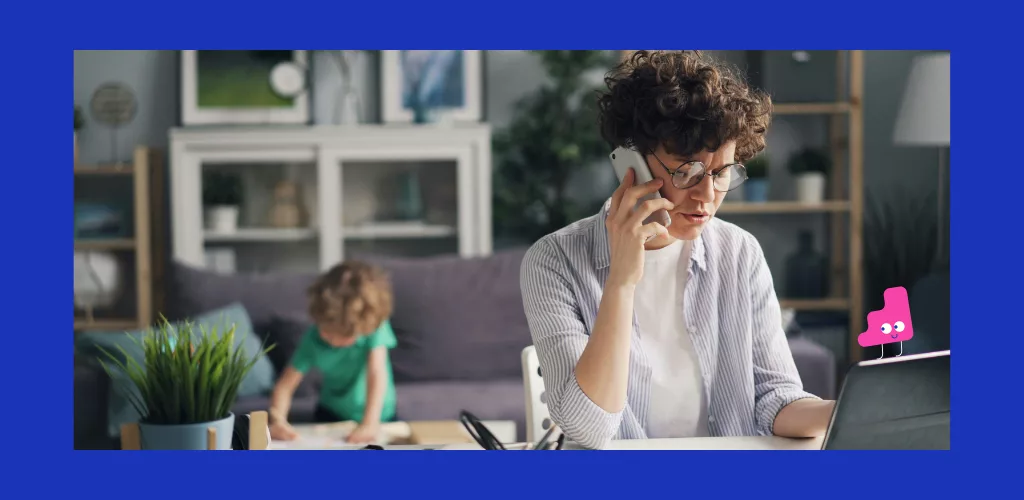Today, a child is practically born with a tablet in his hands, or at least with a smartphone in front of him... Screens are everywhere, all the time. But at what cost? At a time when digital technology is profoundly transforming our daily lives, a 130-page report entitled "Écran, à la recherche du temps perdu", submitted to the French President a year ago by a commission of experts, warned of the deleterious effects of children's early and excessive exposure to screens.
What if the issue wasn't so much to demonize screens... as to regain control?
In this article, we'd like to take a look at the main conclusions of this report, to give you some practical advice for everyday life, and above all, to give sleep and the parent-child bond the place they deserve.
Digital technology: between emancipation and alienation
Digital technology is not evil. In fact, it can be a powerful lever for access to knowledge, creative expression and discovery of the world. This is one of the commission's key findings: screens can emancipate. They provide access to educational content, facilitate learning and open up the world.
But for children, it's also a world where everything goes too fast, too loud, too soon. Experts speak of risks of alienation and the monetization of youthful behavior. The aim is no longer simply to inform or entertain, but to capture the child's attention and keep him or her in an endless, often unsupervised loop.
A worrying trend towards hyperconnection
It's no longer a suspicion, it's a fact: our children are hyperconnected. Platform strategies - addictive algorithms, digital rewards, video loops - have been designed to maximize screen time, without regard for the developmental consequences.
And there are plenty of them.
10 key points of the "Screen Commission" report
Here is a summary of what the report highlights:
-
Liberators but risky Screens offer unlimited access to knowledge, but also present dangers of addiction, abusive monetization and misinformation.
-
Increasing hyperconnection The strategies of digital companies aim to maximize engagement, even if it means locking children into compulsive use.
-
Health at risk The report establishes a clear link between excessive screen use and sleep disorders, obesity, anxiety and eyesight problems.
-
Supervision from an early age Before the age of 4, screen use should be severely restricted, as the brain is still developing.
-
Weakened mental health Digital stress, online harassment and addiction to social networks are contributing to a growing sense of malaise among teenagers.
-
Unsuitable content Children are exposed to violent, sexual or anxiety-provoking content, without sufficient filtering tools.
-
Calls for regulation The report proposes strong legislative measures: bans, control of commercial practices, reinforcement of parental control.
-
Digital education Digital education: Children need to be educated to use digital technology wisely, just as parents need to be trained to support them.
-
Abuse prevention Digital technology can expose people to serious forms of predation (cyber harassment, child pornography, scams). Information and vigilance are key.
-
National strategy A coordinated, ambitious policy is essential to tackle this major public health challenge.
Body and mind on the front line
One of the major themes of the report is health. It establishes a clear link between excessive screen use and sleep disorders, chronic fatigue, childhood obesityand reduced visual acuity. But he also insists on a more insidious reality: the psychological effects.
Because the intensive use of screens, especially social networks, aggravates existing vulnerabilities anxiety, stress and isolation. Although screen addiction is not yet recognized as a disease in its own right, researchers are pointing to worrying trends that affect mental health.
Children need a guide, not another screen
In this digital jungle, children don't need a new gadget, they need a solid reference point. And that reference point is adults. Not to supervise or punish, but to accompany, explain and dialogue.
This starts with simple but consistent rules: no screens in the morning when waking up or before going to bed, age-appropriate content, regular breaks, and a real emphasis on offline activities. Reading a book, running in the park, cooking with the family... These anchoring moments are essential for harmonious development.
Parenting in the digital age also means reinventing yourself
We sometimes forget that our children don't just watch their screens. They're looking at us. They watch the way we hold our phones, the way we answer their questions while scrolling, the way we put our computers down at the table... or not.
Being a parent today sometimes means learning to say, "I'm putting my phone down, you're my priority."
It also means daring to talk about the dangers - even the hardest ones - to better prevent them: cyberbullying, predators, scams, commercial abuses. Digital education should not be a taboo, but a space for free and benevolent dialogue.
In conclusion: prevention for better growth
Exposure to screens is not just a technological or public health issue. It's a question of education, of relationships, of society. The framework we establish today will have a lasting influence on our children's relationship with the digital world... and with themselves.
Digital technology can be an opportunity, provided it is mastered.
And it starts with collective action: a parent who listens, a teacher who explains, a decision-maker who regulates, a child who understands.
It's up to us. Not to control, but to enlighten. Not to forbid, but to protect.
And if you don't know where to start, why not explore tools like COLORI's fresco of screens or Soft Kids' Esprit critique, persévérance, émotions programs, which turn prevention into a family adventure?
Because understanding screens is already a step towards autonomy.
And autonomy is what we want for all our children.




0 comments